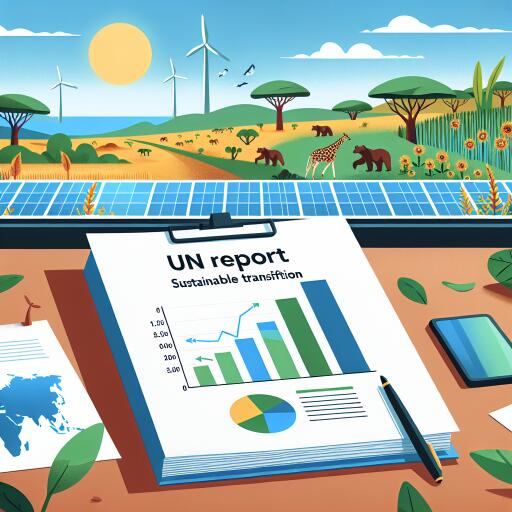
Empowering Africa’s Future: Embracing Just and Sustainable Transitions for Economic, Social, and Environmental Growth
In a profound call to action, the United Nations Economic Commission for Africa (UNECA) unveils a visionary roadmap designed to steer the African continent towards a future of resilience, sustainability, and equitable development. The latest Economic Report on Africa, under the theme ‘Investing in a Just and Sustainable Transition in Africa,’ delves deep into the realms of possibility that lie within Africa’s grasp.
At its heart, the report recognizes Africa’s unique positioning on the global stage, blessed with a vibrant youthful population, expansive arable lands, abundant renewable resources, significant deposits of strategic minerals, and the potential to leapfrog with emerging technologies. These assets not only position Africa as a key player in the global sustainability transition but also provide a foundation to address the continent’s energy accessibility challenges.
The essence of a just and sustainable transition (JST) is illuminated throughout the report, presenting a multi-dimensional approach that intertwines economic prosperity, social equity, and environmental stewardship. It underscores the critical need for transformative policies that align with Africa’s sustainability aspirations, including the necessitation of financing mechanisms conducive to JST endeavors.
Acknowledging the rich tapestry of renewable energy resources available, the report suggests a pragmatic approach towards divesting from fossil fuels. This strategic shift, carefully calibrated to be gradual and context-sensitive, ensures alignment with Africa’s developmental goals and narratives.
However, hurdles remain in the path towards this envisioned future. The report candidly highlights the current shortfall in investments directed towards renewables and sustainability initiatives within the continent, presenting an urgent call to action for bolstering economic, governance, and technological systems to facilitate a transition that is truly just and sustainable.
To catalyze the transition, the report sets forth comprehensive policy recommendations. These envision a future where African nations harness forward-looking visions and strategies to tap into emerging economic and technological opportunities. Key to this transformation is the emphasis on inclusive development of low-carbon and resilient economies that do not compromise on prosperity. Among the strategies proposed are the alignment of national priorities with global commitments like the SDGs and Agenda 2063, the activation of the private sector’s pivotal role, and the pursuit of balanced growth complemented by strategic public investment.
The report also highlights the necessity of innovating financing strategies – calling for new funding avenues while optimizing existing resources, and suggests the establishment of dedicated national mechanisms for JST financing.
Emphasizing the report’s significance, UNECA leadership points out how promoting an accelerated, inclusive, and sustainable growth paradigm—through diversification and green industrialization—can unlock Africa’s immense potential. The vision is for a continent where holistic development plans fundamentally reshape production, consumption, governance, technology, human capital, and financial systems.
The insights and recommendations offered provide a beacon of hope and a strategic guide for sustainable development in Africa. By laying out a framework for just and equitable transitions, the report not only aims to enhance human well-being and future generations’ welfare but also to foster productive employment, sustainable livelihoods, and a vibrant ecosystem. This comprehensive report, unveiled at the opening of the 2024 Africa Regional Forum on Sustainable Development, marks a significant milestone in the journey towards achieving a prosperous, resilient, and sustainable Africa for all.





Leave a Reply